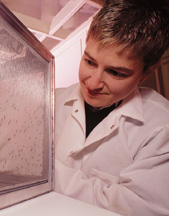![]()
Tech's research rank rises
Pesticides link to Parkinson's investigated
Bear necessities
Scientist seeks genetic solution to malaria
![]()
Virginia Tech's research expenditures of $169.8 million in fiscal year 1997 have placed the university 44th in the nation in research expenditures among all colleges and universities. Tech also ranked 12th among institutions without a medical school, according to the National Science Foundation (NSF).
In 1997, Tech received $2 million from the NSF for research on high performance polymers, millions of dollars from the U.S. Navy, Air Force, and Department of Energy for several information-technology projects, almost $2 million from the Virginia Department of Social Services to develop a food-stamp nutrition-education plan, and $1.5 million from the U.S. Agency for International Development to improve pest control around the globe. And those are only the projects with awards over $1 million.
In 1997, federal agencies were responsible for 68 percent of Tech's research funding, and 14 percent came from industry.
Tech is first in Virginia in terms of research expenditures, according to NSF data. Tech's ranking is up from 51 in 1996.
Back to Contents
Virginia Tech researchers, under a grant from the U.S. Army, are studying pesticides used in the military to determine whether Gulf War veterans are under increased risk of developing Parkinson's disease.
Epidemiological studies have shown farmers and others commonly exposed to pesticides more prone to developing the degenerative disease affecting the central nervous system. Neurotoxins in pesticides are thought to trigger the disease in those with a genetic predisposition.
While the $543,000 army grant will focus on pesticides used by the military, Tech neurophysiologist Jeff Bloomquist is also researching effects of pesticides used by farmers.
Researchers working with Bloomquist and Bradley Klein, professor of biomedical sciences and pathobiology at the Virginia-Maryland Regional College of Veterinary Medicine, will expose mice to neurotoxins. A change in the neurochemistry--the loss of dopamine in the brain--allows the disease to be arrested at its earliest stages.
The goal of the research is to lay groundwork for future research into ways to detect and alter the ability of neurotoxins to trigger the disease. Understanding the processes may allow researchers to work toward prevention and possible reversal of Parkinson's Disease.
Back to Contents
Virginia Tech wildlife researcher Mike Vaughan has found evidence that female bears, not males, regulate the bear population of an area.
When bears overburden their range, the females' physiologic reaction to poor nutrition, not the aggression of males, keeps the numbers down. Vaughan's findings will change how the bear population is managed.
Bears mate in the summer, but the embryo does not implant in the uterus until late fall, about the beginning of hibernation. After a 60-day gestation, the cubs are born and nurse while the sow is sleeping.
Vaughan's field studies indicate when a female is not nutritionally healthy, she will give birth but won't lactate. The cubs starve. To reclaim needed protein, the sow devours the dead cubs when she wakes.
Vaughan's research disproves a theory that an unhealthy female will spontaneously abort prior to implantation. Males were also thought to kill cubs in a stressed population.
The size of the acorn crop and other autumn food determine the nutritional condition of female bears, which impacts the population size. Hunters also annually cull about 500 of Virginia's estimated 4,000 bears.
Back to Contents
Malaria, a parasitic disease transmitted by mosquitoes, has made such a dramatic comeback in some nations that scientists are scurrying to find new ways to control the disease.
Somewhere in the workings of the genes of mosquitoes may be a key to disrupting the insect's complex relationship with the parasites, a key that could break the cycle of transmission. Shirley Luckhart, an assistant professor of biochemistry at Virginia Tech, is searching for that key. She's studying the short period when the malaria parasite develops in a mosquito.
The disease-causing parasites must negotiate a torturous life cycle that alternates between the mosquito and an animal host. Parasites are ingested by a susceptible mosquito as it sucks blood from an infected host; they reproduce during a two-week period within the mosquito and then inject a new generaion of parasites into another host as the mosquito feeds.
mosquito and then inject a new generaion of parasites into another host as the mosquito feeds.
Luckhart said that resistant parasites have emerged for each of the eight drugs that are commercially available to treat malaria. The species of mosquitoes that carry malaria are also becoming resistant to control methods.
Luckhart is attempting to develop a transgenic mosquito that can't transmit the parasite. "First we need to identify candidate genes that affect the life cycle of the parasite," she says. Then she will modify the gene and introduce it into a population of mosquitoes.
Luckhart has found that the immune response of mosquitoes involves the production of nitric oxide. The toxic compound kills some of the parasites in the mosquito, but by the time it is produced the parasite has multiplied sufficiently to ensure that some individuals will survive.
"We may be able to enhance the production of mosquito nitric oxide, or we may be able to change the timing of its release and eliminate the parasite before it has established itself," she says.
Luckhart's work is supported by the U.S. Army, the National Institutes of Health, and the World Health Organization.
Back to Contents
Home | News | Features | Research | Philanthropy | Alumni | Classnotes | Editor's Page